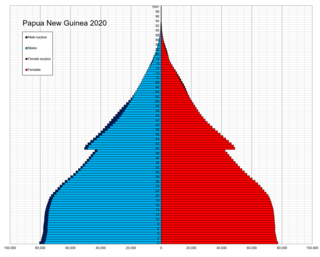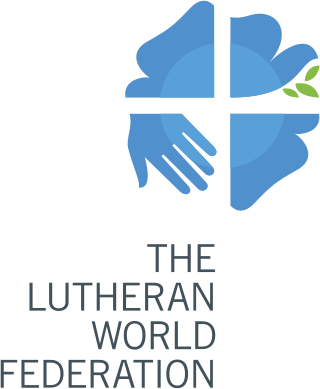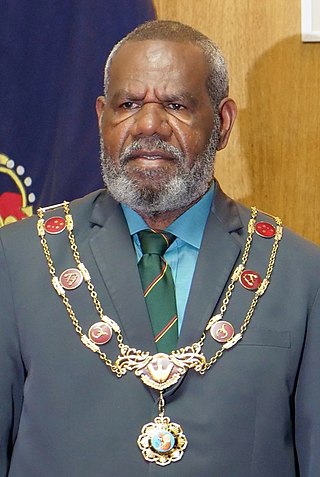The Papua New Guinea Council of Churches (PNGCC) is a Christian ecumenical council in Papua New Guinea.
The Council has four major programs:
Its members comprise:

Papua New Guinea, officially the Independent State of Papua New Guinea, is a country in Oceania that comprises the eastern half of the island of New Guinea and its offshore islands in Melanesia. Its capital, located along its southeastern coast, is Port Moresby. The country is the world's third largest island country, with an area of 462,840 km2 (178,700 sq mi).

The indigenous population of Papua New Guinea is one of the most heterogeneous in the world. Papua New Guinea has several thousand separate communities, most with only a few hundred people. Divided by language, customs, and tradition, some of these communities have engaged in endemic warfare with their neighbors for centuries. It is the second most populous nation in Oceania, with a total population estimated variously as being between 9.5 and 10.1 million inhabitants.
Lae is the capital of Morobe Province and is the second-largest city in Papua New Guinea. It is located near the delta of the Markham River and at the start of the Highlands Highway, which is the main land transport corridor between the Highlands Region and the coast. Lae is the largest cargo port of the country and is the industrial hub of Papua New Guinea. The city is known as the Garden City and home of the University of Technology.

The Lutheran World Federation is a global communion of national and regional Lutheran denominations headquartered in the Ecumenical Centre in Geneva, Switzerland. The federation was founded in the Swedish city of Lund in the aftermath of the Second World War in 1947 to coordinate the activities of the many differing Lutheran churches. Since 1984, the member churches are in pulpit and altar fellowship, with common doctrine as the basis of membership and mission activity.

A united church, also called a uniting church, is a church formed from the merger or other form of church union of two or more different Protestant Christian denominations.
The Gutnius Lutheran Church, formerly the Wabag Lutheran Church, is a Lutheran body existing in Papua New Guinea. Gutnius means "Good News" in Tok Pisin. It was established by the Lutheran Church–Missouri Synod in 1948, shortly after the Australian administration of the Territory of Papua and New Guinea permitted missionary activity to spread into the western highlands. The church counts 125.000 parishioners, largely confined to Enga Province in the western highlands. It operates Immanuel Lutheran Hospital and St. Paul's Lutheran Secondary School (Pausa) at Wapenamanda, Enga Province. The church has other health and educational institutions as well.

Morobe Province is a province on the northern coast of Papua New Guinea. The provincial capital and largest city is Lae. The province covers 33,705 km2, with a population of 674,810, and since the division of Southern Highlands Province in May 2012 it is the most populous province. It includes the Huon Peninsula, the Markham River, and delta, and coastal territories along the Huon Gulf. The province has nine administrative districts. At least 101 languages are spoken, including Kâte and Yabem language. English and Tok Pisin are common languages in the urban areas, and in some areas pidgin forms of German are mixed with the native language.

The Evangelical Lutheran Church of Papua New Guinea is a Protestant church denomination located in Papua New Guinea that professes the Lutheran branch of the Christian faith. The Church is incorporated by a 1991 Act of the Parliament of Papua New Guinea and it has a baptized membership of approximately 900,000 members.

Karkar Island is an oval-shaped volcanic island located in the Bismarck Sea, about 30 kilometres off the north coast of mainland Papua New Guinea in Madang Province, from which it is separated by the Isumrud Strait. The island is about 25 km in length and 19 km in width. In the centre is an active volcano with two nested calderas.
Religion in Papua New Guinea is predominantly Christian, with traditional animism and ancestor worship often occurring less openly as another layer underneath or more openly side by side Christianity. The courts, government, and general society uphold a constitutional right to freedom of speech, thought, and belief. There is no state religion, although the government openly partners with several Christian groups to provide services, and churches participate in local government bodies.

The Anglican Church of Papua New Guinea is a province of the Anglican Communion. It was created in 1977 when the Province of Papua New Guinea became independent from the Province of Queensland in the Church of England in Australia following Papua New Guinea's independence in 1975.

The United Church in Papua New Guinea and Solomon Islands is United church in Methodist and the Reformed tradition.
James Simon Ayong was the Anglican Archbishop of Papua New Guinea from 19 June 1996 to 2009.

Arawa is the largest town and the former capital of the Autonomous Region of Bougainville in Papua New Guinea. It is administered under Arawa Rural LLG.
Sio is an Austronesian language spoken by about 3,500 people on the north coast of the Huon Peninsula in Morobe Province, Papua New Guinea. According to Harding and Clark (1994), Sio speakers lived in a single village on a small offshore island until the Pacific War, after which they established four villages on the nearby coast: Lambutina, Basakalo, Laelo, and Balambu. Nambariwa, another coastal village a few miles to the east, is also Sio-speaking.

The Malagasy Lutheran Church is one of the most important Christian churches in Madagascar, established in 1950 by the unification of 1,800 Lutheran congregations in central and southern Madagascar. The oldest of these congregations was founded in the early 19th century with the arrival of missionaries from the Norwegian Missionary Society (NMS).

Malahang is a suburb of Lae, Morobe Province in Papua New Guinea.

The Malahang Mission Station is a Lutheran filial station situated in Malahang, Morobe Province in Papua New Guinea now under the auspices of the Evangelical Lutheran Church of Papua New Guinea. The Mission station is located on Busu Road, Malahang opposite the Malahang Industrial Area.

Sir Bob Bofeng Dadae is a Papua New Guinean politician who serves as the tenth and current Governor-General of Papua New Guinea. He assumed office as the tenth governor-general on 28 February 2017, succeeding Michael Ogio.
Enny Moaitz is a Papua New Guinean politician. She was Premier of Morobe Province from 1987 to 1988, becoming Papua New Guinea's first and only woman Premier under their former system of decentralised provincial government. She was also a member of the Tutumang, the provincial assembly, from 1980 to 1991.